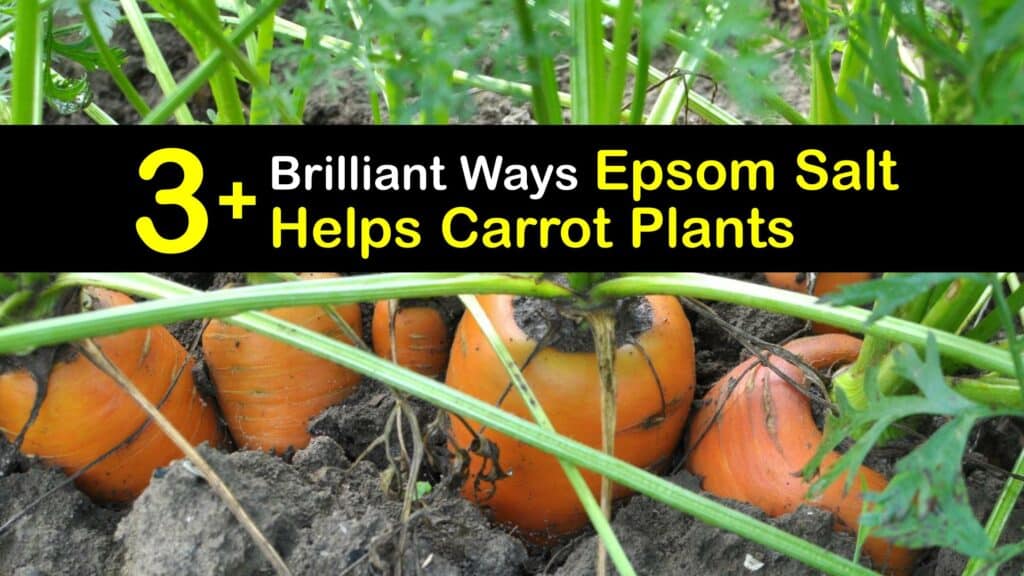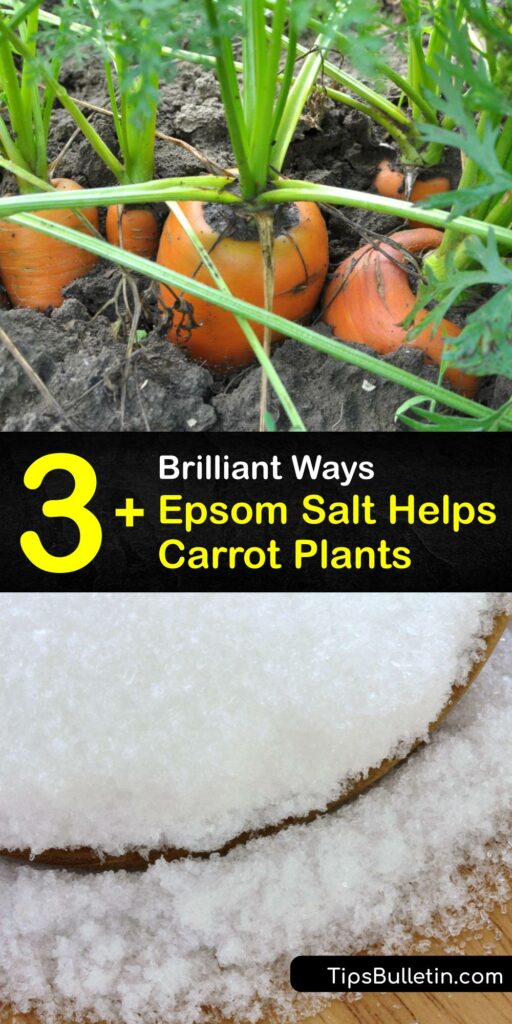Learning how to use Epsom salt for carrots allows you to fertilize your plants and keep insect pests away without purchasing synthetic products. Most people think of Epsom salts as bathing salts for soothing sore muscles, yet there are many reasons to use Epsom salt for carrot plants.
Is Epsom salt good for carrots? Epsom salts are made of tiny magnesium sulfate crystals. Magnesium is essential to help root vegetables such as carrots remain healthy, resist pests and disease, and grow large, well-formed, and tasty roots.
Using Epsom salt for carrot plants has many advantages for experienced growers to brand-new beginners. Epsom salts offer high nutrient content to assist plants in building an extensive root system. If you’re producing tomatoes, carrots, or flowers, they won’t harm the soil or change the pH. Discover the benefits of using Epsom salt as a Roundup alternative and fertilizer with this complete guide.

Epsom Salt for Carrot Plants
Is Epsom salt good for carrots? Using Epsom salt for carrots provides magnesium-hungry plants with nutrients while deterring pests.
Carrots are a favorite root vegetable and a common choice for the home garden, whether you practice conventional or container gardening. Epsom salt soil soaks and foliar sprays support carrots throughout the growing season to produce larger tastier roots.

We have many other methods for making at home fertilizers for your carrot plants. You can use items found on small farms, like chicken manure in the veggie garden, for a quick fertilizer booster.
Is Epsom Salt Good for Carrots?
Epsom salt offers much to everything from a tomato plant to summer squash to carrots. Since it’s magnesium sulfate, Epsom salt is often used to correct magnesium deficiency after it’s diagnosed in a soil test.
Is Epsom salt good for carrot plants? The salts are an excellent choice for natural fertilizer and pest and disease control without resorting to synthetic chemical sprays.
How to Use Epsom Salt for Carrots
Magnesium is an essential nutrient – without it, your carrots decline. Mineral deficiencies limit nutrient intake by preventing photosynthesis and causing a leaf to lose its green tint. Low magnesium levels are indicated by yellowing or curled mature carrot tops and reduced plant growth.
Fortunately, carrot tops are swiftly restored to health with an Epsom salt spray containing hydrated magnesium sulfate, which maintains the viability of the carrot roots underneath.
When diluted Epsom salt is applied directly to carrot leaves, magnesium absorbs quickly into the root crop below. Use four cups of cool water and one spoonful of Epsom salts as a foliar spray on carrot leaves.
Epsom Salt for Carrots – Soil Soak
Craft an Epsom salt solution as a soil soak to ensure nutrient absorption and maximum benefits to your growing carrots. In organic gardening, Epsom salts are widely used to enrich the soil to boost health, vegetable output, and seed germination. They don’t change the pH of acidic soil or degrade its organic matter.
Whether you need to adjust magnesium levels or apply natural fertilizer, an Epsom salt soil soak is an excellent choice.
Combine the Epsom salts with the liquid in a sprayer or watering can, and liberally apply it around the base of your carrot plants so the carrot root absorbs it. Large plants with leaves that are challenging to treat with foliar sprays benefit greatly from soil soaks, enhancing the taste of food crops like tomatoes.
If you have access to animal manure at home, chicken poop makes an excellent carrot fertilizer. Follow our easy guide to make a carrot fertilizer with chicken manure for an excellent organic plant fertilizer in the garden.
Other Ideas for Epsom Salt and Carrots
The National Gardening Association and the Epsom Salt Council claim that Epsom salts promote healthy plant growth for a better harvest. Epsom salts support carrot seed germination at planting time and assist with weed control and pest and disease control through the growing season.
Mix two cups of dry salt into five cups of water for a general pest control solution to put in your sprayer, or sprinkle unscented salts around the bases of your carrot tops to keep slugs at bay.
Whether you practice organic gardening or hope to save money on fertilizer, using Epsom salt for carrot plants is brilliant. More gardeners are turning to familiar products like coffee grounds, banana peel, and Epsom salts to nourish carrot plants instead of expensive store-bought fertilizers.

If you like this article on Epsom salt for carrots, please share these amazing ideas on using Epsom salt for carrot plants with your friends and family on Pinterest and Facebook.